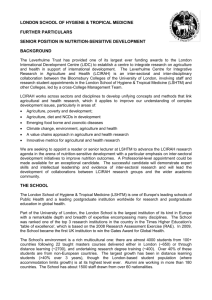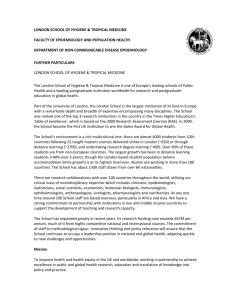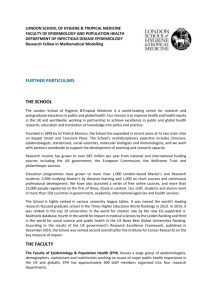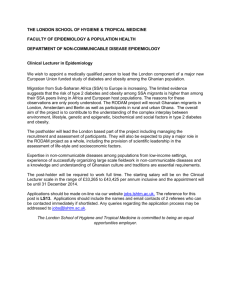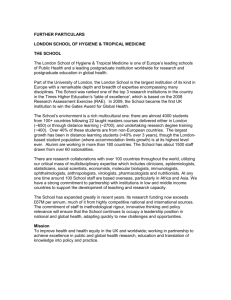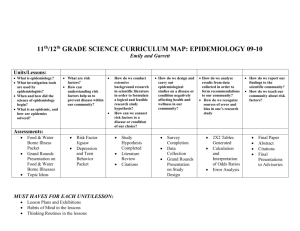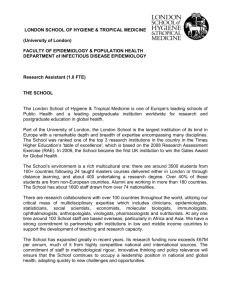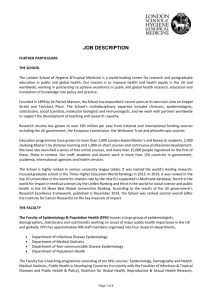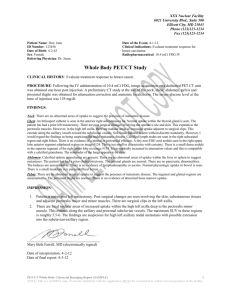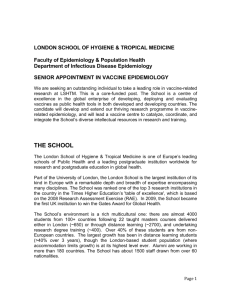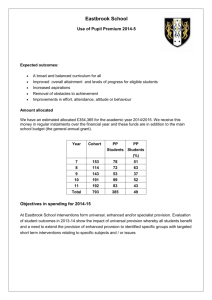Job Description - Jobs at LSHTM
advertisement
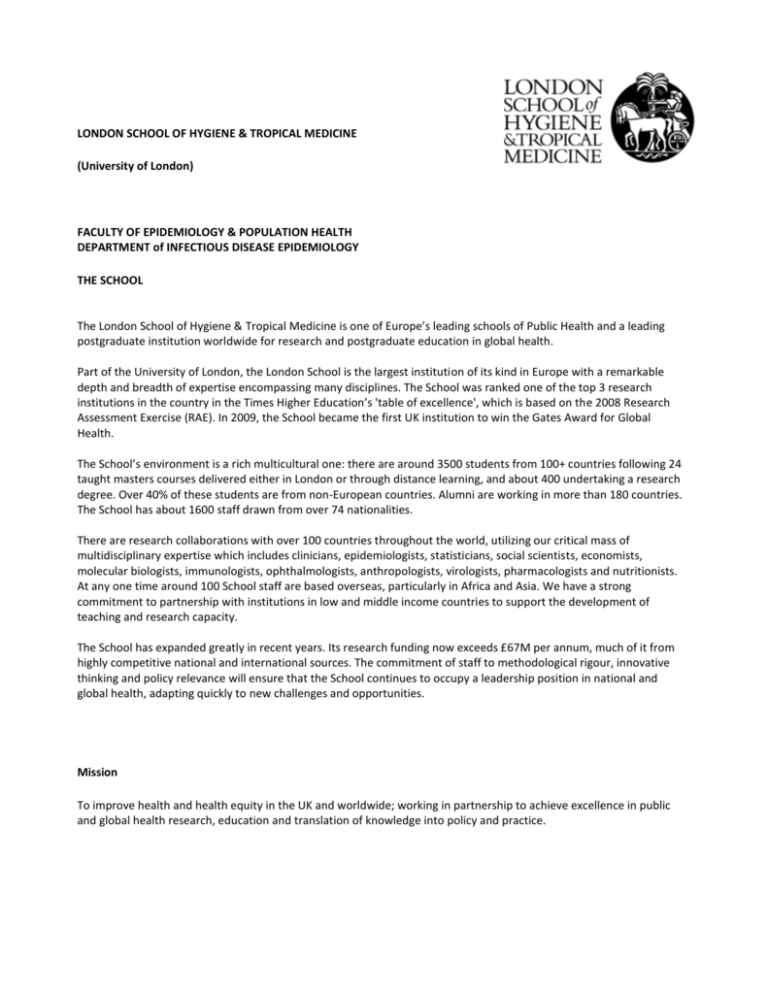
LONDON SCHOOL OF HYGIENE & TROPICAL MEDICINE (University of London) FACULTY OF EPIDEMIOLOGY & POPULATION HEALTH DEPARTMENT of INFECTIOUS DISEASE EPIDEMIOLOGY THE SCHOOL The London School of Hygiene & Tropical Medicine is one of Europe’s leading schools of Public Health and a leading postgraduate institution worldwide for research and postgraduate education in global health. Part of the University of London, the London School is the largest institution of its kind in Europe with a remarkable depth and breadth of expertise encompassing many disciplines. The School was ranked one of the top 3 research institutions in the country in the Times Higher Education’s 'table of excellence', which is based on the 2008 Research Assessment Exercise (RAE). In 2009, the School became the first UK institution to win the Gates Award for Global Health. The School’s environment is a rich multicultural one: there are around 3500 students from 100+ countries following 24 taught masters courses delivered either in London or through distance learning, and about 400 undertaking a research degree. Over 40% of these students are from non-European countries. Alumni are working in more than 180 countries. The School has about 1600 staff drawn from over 74 nationalities. There are research collaborations with over 100 countries throughout the world, utilizing our critical mass of multidisciplinary expertise which includes clinicians, epidemiologists, statisticians, social scientists, economists, molecular biologists, immunologists, ophthalmologists, anthropologists, virologists, pharmacologists and nutritionists. At any one time around 100 School staff are based overseas, particularly in Africa and Asia. We have a strong commitment to partnership with institutions in low and middle income countries to support the development of teaching and research capacity. The School has expanded greatly in recent years. Its research funding now exceeds £67M per annum, much of it from highly competitive national and international sources. The commitment of staff to methodological rigour, innovative thinking and policy relevance will ensure that the School continues to occupy a leadership position in national and global health, adapting quickly to new challenges and opportunities. Mission To improve health and health equity in the UK and worldwide; working in partnership to achieve excellence in public and global health research, education and translation of knowledge into policy and practice. THE FACULTY The Faculty of Epidemiology & Population Health (EPH) houses a large group of epidemiologists, demographers, statisticians and nutritionists working on issues of major public health importance in the UK and globally. EPH has approximately 330 staff members organised into four research departments. Department of Infectious Disease Epidemiology Department of Medical Statistics Department of Non-communicable Disease Epidemiology Department of Population Health The Faculty has a teaching programme consisting of ten MSc courses: Epidemiology, Demography and Health, Medical Statistics, Public Health in Developing Countries (run jointly with the Faculties of Infectious & Tropical Diseases and Public Health & Policy), Nutrition for Global Health, Reproductive & Sexual Health Research, Veterinary Epidemiology (run jointly with the Royal Veterinary College), Global Mental Health (run jointly with Kings College London - Institute of Psychiatry) and the Distance Learning courses in Epidemiology and Clinical Trials. The Faculty also has approximately 149 research students studying for an MPhil, PhD or DrPH degree. The Dean of Faculty is Professor John Edmunds. Leverhulme Centre for Integrative Research on Agriculture and Health (LCIRAH) LCIRAH is a Centre established under a five-year £3.5m grant from The Leverhulme Trust to build a new intersectoral and interdisciplinary platform for integrating research in agriculture and health, with a focus on international development goals. This Centre is enabling researchers from the London School of Hygiene and Tropical Medicine, School of Oriental and African Studies, School of Pharmacy, and Royal Veterinary College to work together to develop unifying research approaches and methodologies that integrate agricultural and health research. The aim is to better address complex global issues surrounding feeding nine billion people healthily by 2050. The Centre is managed by a group of experts from across the Colleges, including Professors in agriculture and health who provide LCIRAH with vision and leadership. Staff and students from across the Colleges are co-located in a dedicated facility at LIDC. Further details of the Centre’s work can be found on www.lcirah.ac.uk. 2 THE POST Job Description Post: Research Fellow in Knowledge Uptake and Management Grade: 6 Responsible to: Suneetha Kadiyala Job summary Innovative Metrics and Methods for Agriculture and Nutrition Actions (IMMANA) aims to accelerate the development of a robust and coherent scientific evidence base which will underpin effective and cost-effective investments in agriculture-food systems for improved nutrition and health. To achieve this three inter-locking and synergistic project workstreams will be established, of which a Global Research Network is one. A network connecting researchers and research groups, to ensure rapid sharing, development and use of the best approaches emerging from their work and from the grants and fellowships is proposed in the IMMANA programme. The Global Research Network has four main objectives: 1. To share and make widely available the latest methods and metrics for design and evaluation of agriculture programmes for improved nutrition and health 2. To stimulate development, harmonization and testing of metrics and methods through support to working groups involving different network institutions and researchers 3. To strengthen the capacity of institutions and researchers in LMICs to organize and undertake intersectoral and interdisciplinary research in agriculture-food systems for nutrition and health. 4. To help researchers build consensus on appropriate methods and to engage effectively with programmes and policy makers to improve their uptake and the generation of evidence. Responsibilities The network will be managed by a Research Uptake and Knowledge Manager, who will also be responsible for establishing, coordinating and managing the network and programme-wide research uptake. The post holder is envisioned to lead the following activities, although the portfolio is expected to be demand driven as the Network evolves: Manage the annual global conference and meetings – these will last 4-5 days and will include a 2-day conference followed by two days for working group activities and training sessions (see below). The Programme Management Committee and the Advisory Group will also have its annual meeting at these events. The Role Holder (RH) will provide overall coordination support to the conference and training sessions working with speakers, participants and external suppliers and subsequently collecting and disseminating learning from the meetings. Coordinate and the support the Working Groups – these will be established to pursue collaborative research activities identified by network members. They will include both technical, methods-focused groups and policy working groups that will prepare relevant evidence-based technical and policy briefs to inform scientific research and policy dialogue. Selected by the network itself (see below), they will receive modest funds to 3 facilitate work at Annual Meetings. The RH will provide coordination and support to the working groups, preparing meetings, taking notes and ensuring follow-up. Manage online communications and collaborations– create, develop and manage a website for the network which will provide information about network activities, grants and fellowships; and a virtual collaborative workspace which will collect learning and allow network members to share knowledge and collaborate. The RH will act as website manager and moderator of the online community, ensuring constant engagement of members and encouraging collaboration. The RH will develop and manage e-consultations and produce digital outputs such as videos and podcasts. Promote the activities and disseminate learning from the project – develop and implement an overall branding and communications strategy to attract members to the network and promote its grants, fellowships and events. The audiences will include researchers, practitioners and specialist media outlets. Lead research uptake activities – develop a research uptake strategy for IMMANA, identify appropriate audiences and channels, and lead the implementation of research uptake activities, primarily with research, practitioner and policy constituencies. Produce and disseminate key research outputs such as reports, blogs, policy briefings, case studies and podcasts/ videos. Financial responsibility for network expenditure, monitoring expenditure and making sure the network activities are within budget Responsible for producing progress and financial reports for the programme manager Training – Training sessions in hard and soft skills will be organized at annual meetings, and a budget has been proposed to bring learned mentors to meetings for this purpose. Online training will also be provided. The RH will coordinate training activities for network members as well as deliver some training sessions, in particular with respect to research uptake and policy. The RH will develop and maintain an online platform to deliver online webinars and training sessions. Monitor and evaluate the effectiveness of network activities and the research uptake strategy. Represent the network at external meetings and present its activities as appropriate, working under the supervision of the PI. Person Specification Essential Criteria Excellent writing and editing skills and experience writing for various formats such as websites, blogs, briefing papers. Experience in synthesising research findings and communicating them via appropriate channels to various specialist and non-specialist audiences, including media, practitioners and policy-makers. Experience of setting up and managing complex websites and interactive virtual communities. Experience of managing research networks. Proven ability and willingness to organise events overseas. Post graduate degree in international development or a related discipline or equivalent experience. Ability to work independently and as part of a small team. 4 Desirable Criteria PhD in a suitable research area. Experience managing meetings and events (from small seminars to large conferences) in the UK and overseas. Experience and knowledge of the higher education and/ or research sector. Experience of setting up and managing collaborative interdisciplinary networks internationally. Knowledge and understanding of the agriculture and nutrition sectors Experience of communications and marketing of research and higher education activities such as research grants and events Experience in contracting and supervising external providers such as graphic designers, printers and web developers SALARY AND CONDITIONS OF APPOINTMENT The appointment is available from July 2014. The appointment will be made on LSHTM’s Research Fellow scale (£37,106 – £42,139) depending on qualifications and experience. The post will be subject to the LSHTM terms and conditions of service. Membership of the USS pension scheme is available. APPLICATIONS Applications should be made on-line at our website at jobs.lshtm.ac.uk. The closing date is 24 September 2014 and the reference for this post is SK05. Online applications will be accepted by the automated system until midnight on of the closing date. For informal enquiries about the post please contact. Any queries regarding the application process may be addressed to jobs@lshtm.ac.uk. The supporting statement section should set out how your qualifications, experience and training meet each of the selection criteria. Please provide one or more paragraphs addressing each criterion. The supporting statement is an essential part of the selection process and thus a failure to provide this information will mean that the application will not be considered. An answer to any of the criteria such as "Please see attached CV" will not be considered acceptable. Please note that if you are shortlisted and are unable to attend on the interview date it may not be possible to offer you an alternative date. The London School of Hygiene & Tropical Medicine is committed to being an equal opportunities employer. 5
